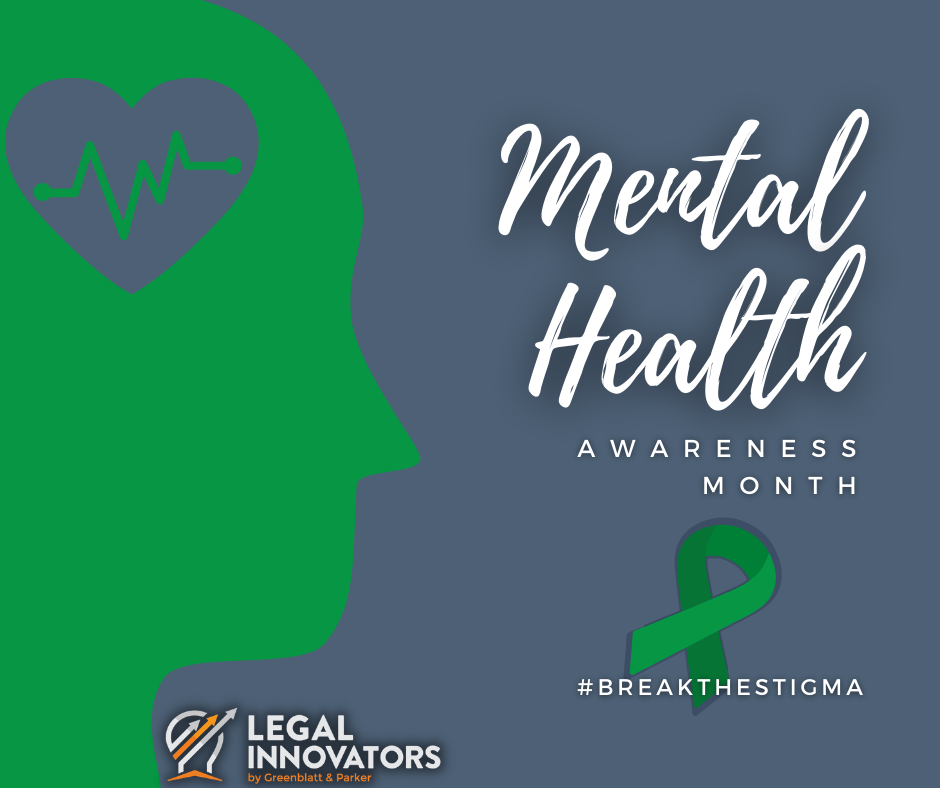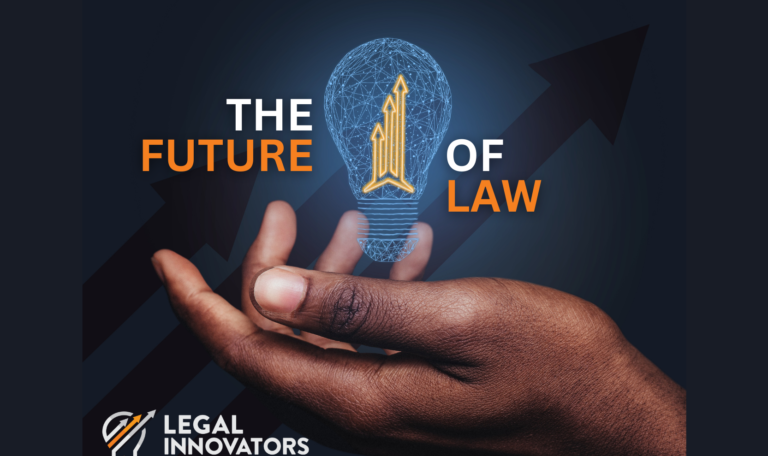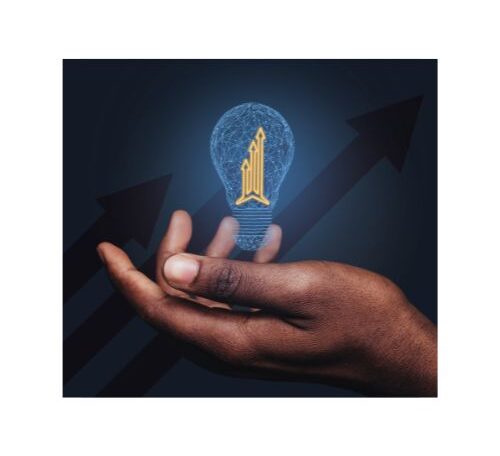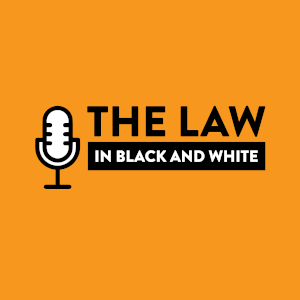By: Jesse Walker, Psy.D
 May is observed as Mental Health Awareness Month in the United States. This blog post features some of the issues of mental health in the legal profession and identifies a set of resources that provide helpful information and instructions on maintaining mental health and wellness in the legal community.
May is observed as Mental Health Awareness Month in the United States. This blog post features some of the issues of mental health in the legal profession and identifies a set of resources that provide helpful information and instructions on maintaining mental health and wellness in the legal community.
For many, the terms “lawyer” and “mental health” may seem like oxymorons. The demanding time commitments and high-pressure work environments at many law firms often have detrimental effects on mental health in the legal profession. [1]
Lawyers have always been susceptible to higher rates of mental health challenges, such as depression, addiction and suicide, compared to the general population. [2] Moreover, since the coronavirus pandemic altered the legal industry and placed restrictions on how and where attorneys can work, there has been a significant increase in lawyer mental health distress, particularly amongst young attorneys and those from minority backgrounds. [3]
Lawyer mental health: an ongoing struggle
Recent studies demonstrate the overall serious impacts of the legal profession on lawyer mental health. According to a study released in 2016 by the American Bar Association’s Commission on Lawyer Assistance Programs and the Hazelden Betty Ford Foundation that surveyed nearly 13,000 attorneys, 28% of attorneys struggle with some level of depression. The survey also found that 23% of attorneys experience symptoms of stress, 21% are considered problem drinkers and 19% demonstrate symptoms of anxiety. [4]
Attorneys of color: the most impacted
Research not only suggests that mental health in the legal profession continues to deteriorate, but that attorneys of color are impacted most heavily. [5] ALM Intelligence’s 2021 Mental Health and Substance Abuse Survey illustrated the ever-present damage the pandemic has had on overall attorney well-being, with more than 3,200 respondents reporting significant increases in symptoms of depression and anxiety. Moreover, when the data is broken down by race, minority attorneys reported higher rates of suicidal thoughts, depression, and isolation than their white colleagues. Notably, when asked if they have ever contemplated suicide during their legal career, 31% of Black lawyers said they had, while 23% of Hispanic and Latino attorneys, 20% of Asian attorneys and 19% of white attorneys reported the same tendencies. [6]
Covid-19 & ongoing mental health struggles
Young attorneys continue to experience unique mental health challenges since the start of the coronavirus pandemic. [7] Often isolated from friends and family, less-established lawyers lack the same support structures that law firm leaders, partners or more senior colleagues benefit from, making them even more susceptible to mental health struggles, like depression, anxiety, stress, and substance abuse.
Many young attorneys are also forced to navigate an uncertain job market created by the pandemic, power through unpredictability to meet their billable hour requirements and find effective ways to build their reputation despite the ongoing global health crisis. Without adequate support from law firms and employers, experts report that the pandemic could have a damaging impact on the mental health of the next generation of attorneys. [8]
Where does the legal profession go from here?
Mental health is a pervasive issue that the legal profession must find systematic ways to address. The future of lawyers’ well-being depends upon the industry identifying better systems and processes to promote mental health.
According to the ALM 2021 survey, 54% of respondents said their firms increased their commitment to attorney mental health during Covid-19, while 46% reported their firms did not. Overall, 63% said they believe their firm’s concern for mental health is sincere, a 2% increase from 2019. [9]
To address employee wellbeing during the pandemic, respondents reported that firms introduced free programs like yoga and meditation classes, held workshops with mental health professionals, and some restricted internal meetings in the afternoons so employees could enjoy some hours with sunlight. While mental health initiatives are offered by law firms, many junior lawyers have said that the practicalities of the job make it difficult to participate in such initiatives because increased client demand means they have no downtime. [10]
Mental Health Support: at Legal Innovators and beyond
It is imperative that all attorneys have access to the quality mental health support they deserve. Further, it is crucial to address the specific mental health challenges facing the most vulnerable populations in the legal field. Below are some resources and steps recommended to those struggling with a mental health challenge:
For Practicing Lawyers
- Seeking support from your employer. At Legal Innovators, we have designed a Wellness Services Program to support our attorneys and their mental health needs. Our lawyers can schedule a confidential, 1:1 meeting with the Head of Wellness to identify particular areas of concern and receive personalized wellness care (i.e. therapy match services, custom-tailored wellness plans, ongoing mental health support, etc). For more information, please contact Jesse Walker, Head of Wellness, at jwalker@legal-innovators.com.
- Lawyer Assistance Programs (LAPs) throughout the country provide confidential services and support to judges, lawyers and law students facing mental health issues.
- The Lawyers Depression Project comprises legal professionals of all kinds who have suffered from mental health conditions. The group hosts confidential support groups meetings that allow for anonymity.
- The Lawyer Well-Being Tool Kit, published in collaboration with the American Bar Association, discusses the importance of lawyer well-being and suggests methods for improving that well-being from the perspectives of both lawyers and legal employers.
- The ABA Commission on Lawyer Assistance Programs has a website that provides daily updates and resources for lawyers, judges, and law students to help combat alcoholism, substance abuse, and mental health disorders and to support their mission of helping lawyers recover, preserve their families, and better serve their clients.
- The ABA Commission on Lawyer Assistant Programs Podcast on the Path to Law Student Well Being is a podcast that features law students and legal educators discussing relevant issues concerning character and fitness, mental health, and substance use disorders.
For General Mental Health Support:
- The Centers for Disease Control and Prevention. The CDC’s wellbeing page has a number of explainers on wellbeing topics, such as how wellbeing relates to public health and how it can be measured.
- The Mental Wellness Awareness Association. Find call centers, online counseling, and other mental wellness services from the Mental Wellness Awareness Association.
- The National Institute of Mental Health. Find hotlines, providers, and other resources for mental health issues provided by the National Institute of Mental Health.
- Psychology Today. An online resource that features therapy and health professional directories, as well as hundreds of blogs written by a wide variety of psychologists, psychiatrists, social workers, medical doctors, sociologists, and science journalists.
- The National Suicide Prevention Lifeline. The Lifeline provides 24/7, free, and confidential crisis support for people struggling with suicidal thoughts, ideation, and behaviors. Call 1-800-273-TALK.
- Crisis Text Line. A text-based, free, crisis-support resource. Text HOME to 741741 to connect with a Crisis Counselor.
Mental Health Resources for BIPOC:
- The Asian Mental Health Project aims to educate and empower Asian communities seeking mental healthcare.
- 50 AAPI Anti-Racism and Mental Health Resources is a list including professional development resources, mental health and self care resources, and employer resources.
- Behavioral Health Division of the Indian Health Service promotes the integration of behavioral health and primary care treatment, while respecting the balance, wellness, and resilience of AI/AN people.
- Black Emotional and Mental Health Collective (BEAM) is a group aimed at removing the barriers that Black people experience getting access to or staying connected with emotional health care and healing.
- Black Men Heal provides mental health treatment, education, and resources for men of color.
- Black Mental Health Alliance provides information, resources, and a “Find a Therapist” locator to connect people with culturally competent mental health professionals.
- Circles of Care is a SAMHSA Center for Mental Health Services, Tribal Training and Technical Assistance Center program that creates models of care for American Indian and Alaska Native youth.
- Dear Black Women Project is an affirmation movement for Black women by Black women, and includes affirmations, resources, therapist connections, and events.
- Liberate Meditation is an app created by BIPOC folks for the BIPOC community.
- The Loveland Foundation prioritizes opportunity, action, validation, and healing for communities of color with a particular focus on Black girls and women. It includes a therapy fund to provide assistance to Black women and girls seeking therapy nationally.
- Melanin and Mental Health connects individuals with culturally competent clinicians committed to serving the mental health needs of Black & Latinx/Hispanic communities. Promotes the growth and healing of diverse communities through its website, online directory and events.
- One Sky Center is a national resource center for American Indigenous and Alaskan Indigenous communities for access to health, education, and research.
- The Steve Fund is an organization focused on supporting the mental health and emotional wellbeing of young people of color.
- Real to the People was created as a response to COVID-19 pandemic and offers free therapy services to help people cope, including group support series 4 times/week.
[1] Kane, Sally. “The 10 challengers about a career as a lawyer.” The Balance Careers, 20 November 2019. https://www.thebalancecareers.com/lawyer-career-drawbacks-2164594
[2] Krill, Patrick; Johnson, Ryan; Albert, Linda. “The prevalence of substance use and other mental health concerns among american attorneys.” Journal of Addiction Medicine. 10 February 2016. https://www.ncbi.nlm.nih.gov/pmc/articles/PMC4736291/
[3] Scharf, Stephanie & Liebenberg, Roberta. “Practicing law in the pandemic and moving forward: results and best practices from a nationwide survey of the legal profession.” American Bar Association. 2021. https://www.americanbar.org/content/dam/aba/administrative/digital-engagement/practice-forward/practice-forward-survey.pdf
[4] Krill, Patrick; Johnson, Ryan. “The prevalence of substance use and other mental health concerns among attorneys.” Journal of Addiction Medicine. January/February 2016. https://journals.lww.com/journaladdictionmedicine/fulltext/2016/02000/the_prevalence_of_substance_use_and_other_mental.8.aspx
[5] Jackson, Dylan. “Attorneys of color reveal alarmingly higher instances of mental health struggles.” Law.com International. 8 June 2021. https://www.law.com/international-edition/2021/06/08/attorneys-of-color-reveal-alarmingly-higher-instances-of-mental-health-struggles-378-171251/#:~:text=ANALYSIS-,Lawyers%20of%20Color%20Reveal%20Alarmingly%20Higher%20Instances%20of%20Mental%20Health,respondents%20that%20said%20the%20same.
[6] Miller-Kuwana, Karen; Ouyang, Linda. “Analysis: attorney well-being declines, with burnout on the rise.” Bloomberg Law. 3 March 2022. https://news.bloomberglaw.com/bloomberg-law-analysis/analysis-attorney-well-being-declines-with-burnout-on-the-rise
[7] Bagby, Laura. “New data reveals the startling mental health struggles of attorneys of color.” 2Civility. 10 June 2021. https://www.2civility.org/new-data-reveals-the-startling-mental-health-struggles-of-attorneys-of-color/#:~:text=Breaking%20down%20the%20data%20by,colleagues%2C%20according%20to%20the%20survey.
[8] Scharf, Stephanie & Liebenberg, Roberta. “Practicing law in the pandemic and moving forward: results and best practices from a nationwide survey of the legal profession.” American Bar Association. 2021. https://www.americanbar.org/content/dam/aba/administrative/digital-engagement/practice-forward/practice-forward-survey.pdf
[8] Sanders, Anna. “Pandemic fuels mental health crisis for young attorneys.” Law 360. 25 January 2021. https://www.law360.com/pulse/articles/1346967/pandemic-fuels-mental-health-crisis-for-young-attorneys
[9] ALM Staff. “The legal industry’s mental health problem grew in 2020, our survey shows.” The American Lawyer. 3 May 2021. https://www.law.com/americanlawyer/2021/05/03/the-legal-industrys-mental-health-problem-grew-in-2020-our-survey-shows/
[10] Bagby, Laura. “New data reveals the startling mental health struggles of attorneys of color.” 2Civility. 10 June 2021. https://www.2civility.org/new-data-reveals-the-startling-mental-health-struggles-of-attorneys-of-color/#:~:text=Breaking%20down%20the%20data%20by,colleagues%2C%20according%20to%20the%20survey.




